Key takeaways:
- Parental involvement fosters a sense of belonging, enhances communication, and empowers both parents and students within the school community.
- Active participation by parents in school activities can lead to improved academic performance and emotional security for children.
- Collaboration between parents and educators to promote values, including pro-life principles, can significantly influence students’ moral development and community culture.
- Effective strategies for parental advocacy include fostering open communication, collaborating on meaningful projects, and creating informal spaces for discussion.
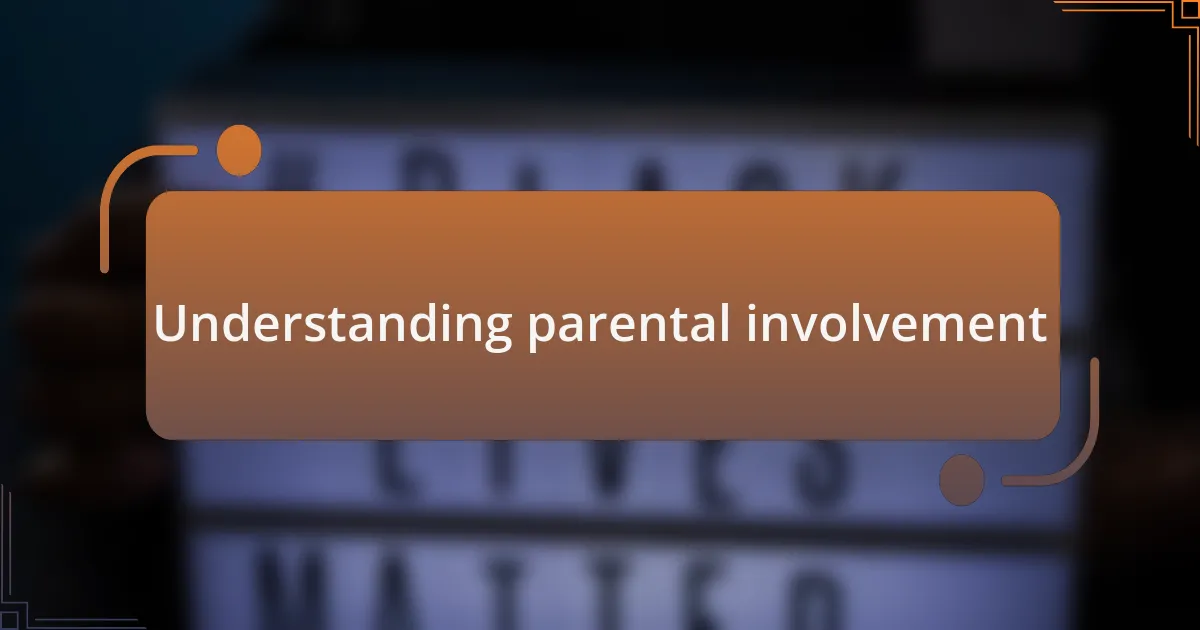
Understanding parental involvement
Parental involvement in schools often manifests in various forms, from attending parent-teacher meetings to volunteering for school events. I remember when I volunteered for a literacy program; seeing the excitement in children’s eyes as they discovered the joy of reading was incredibly rewarding. This personal connection enriches the school community and reinforces the idea that education is a collaborative effort.
One pivotal aspect of understanding parental involvement is recognizing how it fosters a sense of belonging for both parents and students. Think about it: when parents engage actively, they send a powerful message to their children about the value of education. I’ve seen parents rallying together for a fundraiser, and it struck me how this collective effort boosts not just school resources but also community spirit.
It’s worth asking ourselves, what barriers prevent parents from getting involved? In my experience, some may simply feel overwhelmed or unsure of where to start. By addressing these barriers and creating inclusive opportunities for participation, we can transform our schools into nurturing environments where everyone feels empowered to contribute.
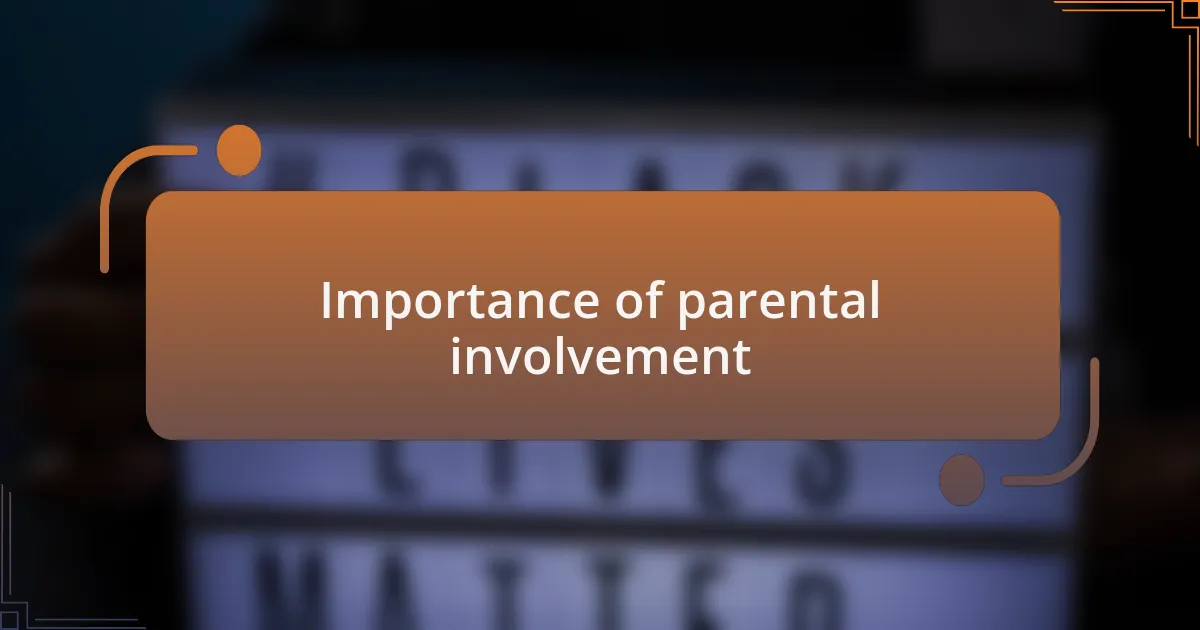
Importance of parental involvement
Parental involvement is crucial in shaping children’s educational experiences. I recall a time when a parent shared their story of how attending a simple school event opened up lines of communication with their child. This engagement not only strengthened their bond but also reinforced the child’s commitment to their studies. It’s fascinating to realize how a parent’s presence can create a ripple effect, inspiring children to take their education seriously.
When parents participate in school activities, it fosters a culture of collaboration and support. I often think about the difference it makes when parents come together for a common goal, such as organizing a science fair. It’s like adding a vibrant color to a monochrome canvas—suddenly, the event becomes more engaging for students, who take pride in showcasing their work. This collective involvement can spark a lifelong love for learning.
Moreover, the emotional benefits of parental involvement extend beyond academic performance. I remember chatting with a fellow parent who mentioned how their active engagement in school life helped their child feel more secure and valued. It made me reflect: how can we encourage every parent to take that leap? When we prioritize these connections, we’re not just influencing individual students; we’re uplifting entire communities and fostering a brighter future for all.
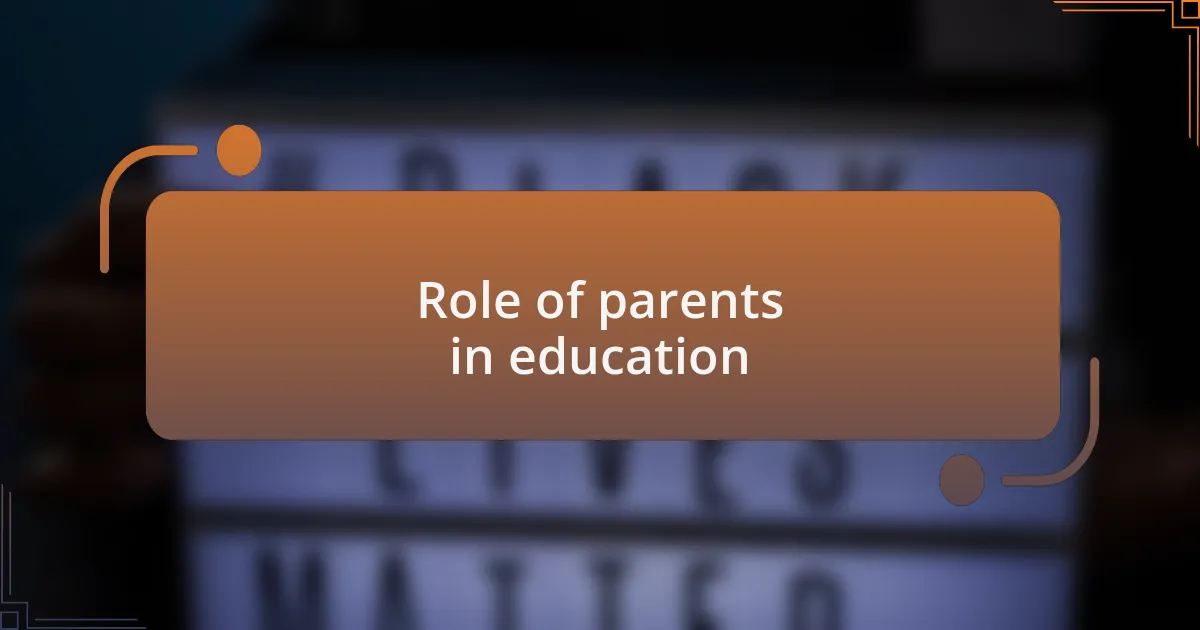
Role of parents in education
When it comes to education, parents play an indispensable role that often goes unrecognized. I remember attending a parent-teacher conference where I saw firsthand how a parent’s questions sparked a more profound discussion about their child’s learning needs. It struck me then that parents are not just bystanders; they are vital advocates who can push for tailored educational support when they truly engage with the system.
Think about how involved parents enrich the educational journey. In my experience, I’ve witnessed the enthusiasm that arises when parents volunteer for classroom activities. It’s heartening to see children light up when their parents help with projects or read stories. This involvement not only strengthens the parent-child relationship but also creates an inviting environment that promotes positive attitudes toward learning. I often ask myself: what if every child had that encouragement at home? It’s worth reflecting on the transformative impact such support can create.
There’s a deeper emotional layer to parental involvement as well. I met a mom who shared that her regular presence at school events transformed her shy daughter into a more confident participant in class. This made me question how many children might be thriving if only their parents felt empowered to participate more actively. Engaging parents in educational spaces helps children feel recognized and understood, fostering an atmosphere where they not only learn but also grow as individuals.
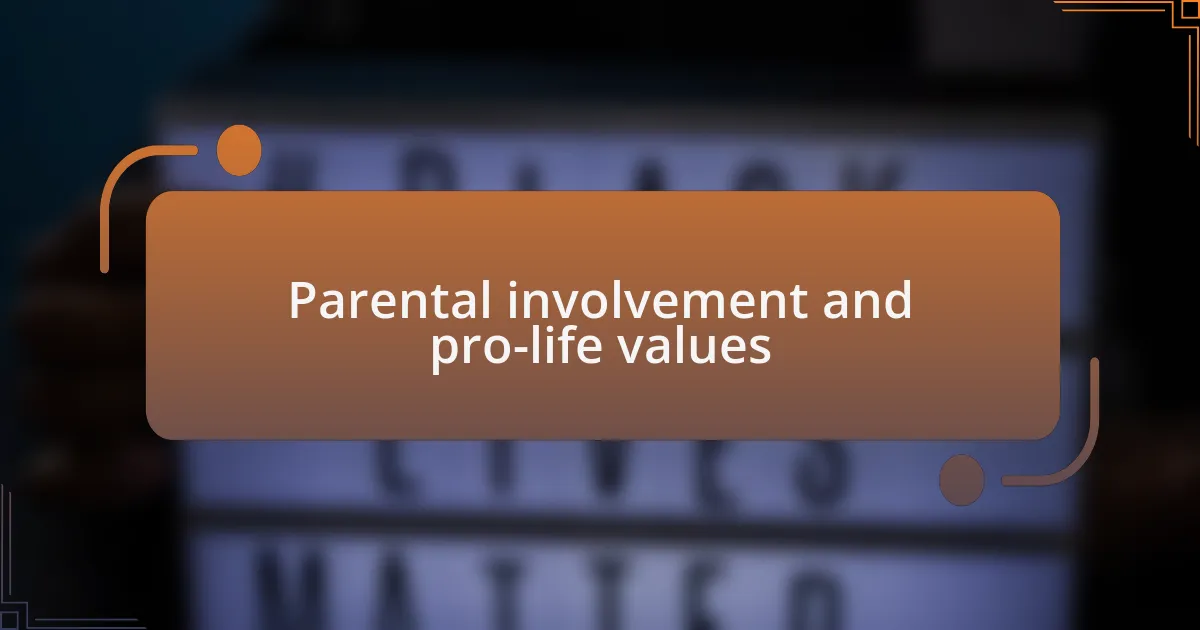
Parental involvement and pro-life values
Parental involvement serves as a bridge between home values and school environments, particularly when it comes to instilling pro-life principles. I recall an instance when a group of parents organized a seminar on the importance of respecting life, and their collective efforts not only fostered a dialogue within the school community but also inspired students to think critically about these values. How powerful is it when parents actively promote a culture of life alongside academic education?
Moreover, it’s fascinating to see how parental advocacy can influence the curriculum to reflect pro-life values. In one school, I witnessed parents successfully advocate for discussions around ethical issues related to life and family. This engagement empowered students to explore their beliefs deeply and articulate their views respectfully. Have you noticed how impactful these conversations can be in shaping a student’s moral compass?
I often think about the long-term benefits of raising awareness about pro-life values through parental involvement. When parents collaborate with educators to emphasize compassion and responsibility, they not only promote a supportive community but also shape the next generation’s worldview. Isn’t it encouraging to consider how this collaborative approach can ignite a passion for life in young hearts and minds?
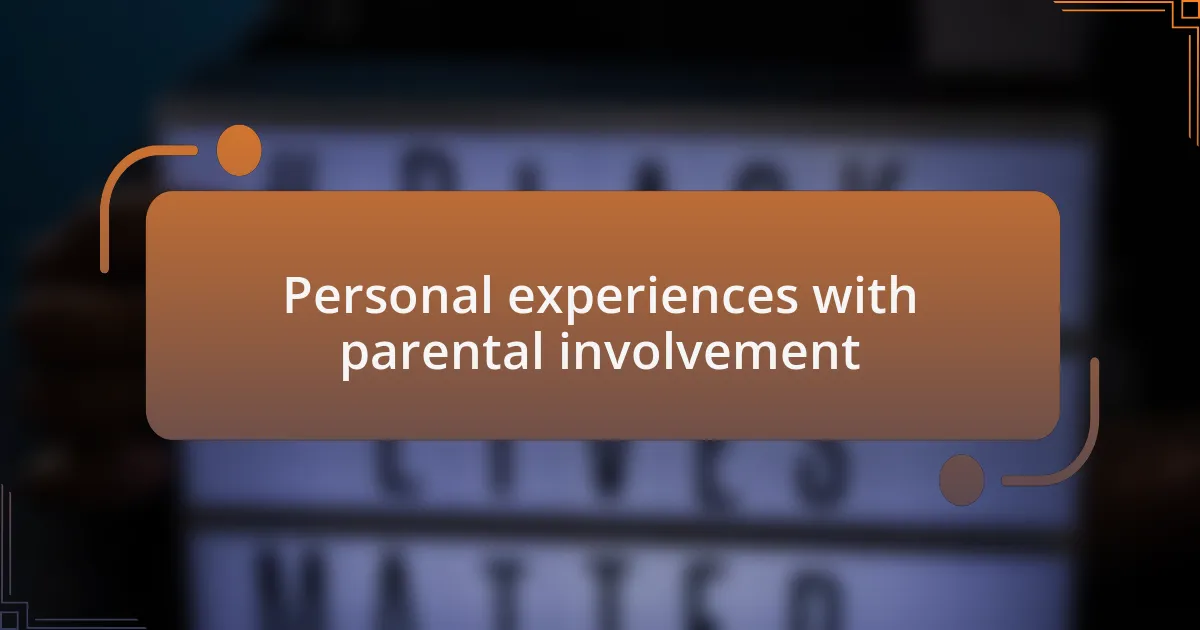
Personal experiences with parental involvement
When I think back to my own school days, parental involvement was often the heartbeat of our community activities. I recall my mom volunteering to lead a discussion group focused on pro-life literature. The way she connected with other parents sparked conversations that motivated me to reconsider my own values and beliefs. How often do we underestimate the power of a single voice in shaping not just a child’s perspective, but an entire community’s?
There was another memorable occasion when a concerned group of parents organized a peaceful demonstration to raise awareness about the importance of life issues. I participated, and the energy in the air was palpable. Watching my peers and their families unite for a cause they believed in instilled a sense of pride. It made me realize how togetherness in advocacy could create a ripple effect, propelling our values into the very fabric of our school culture.
Reflecting on these experiences, I see how much my parents’ involvement has influenced my own journey in advocating for pro-life values. Their consistent participation showed me that standing up for one’s beliefs isn’t just about speaking out; it’s also about actively engaging and collaborating with others. Isn’t it inspiring to think about the lasting impact we can make when we unite for a cause that resonates deeply with our hearts?
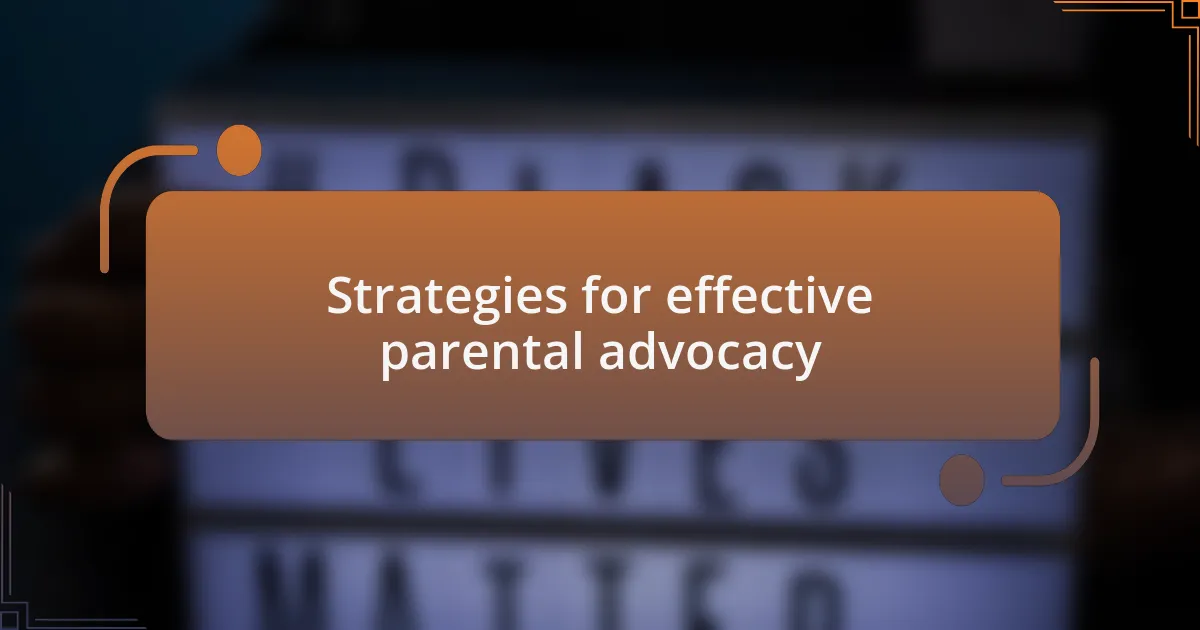
Strategies for effective parental advocacy
Engaging parents in school activities can take various forms, but one of the most effective strategies I’ve seen is fostering open lines of communication between parents and school administration. I remember attending a school board meeting where a parent spoke candidly about her concerns regarding the curriculum. Her bravery in voicing her thoughts not only prompted constructive dialogue but also inspired others to share their perspectives. Isn’t it fascinating how one clear and honest conversation can set the tone for ongoing discussions that matter?
Another powerful strategy for parental advocacy is collaborating on projects that resonate with school values. I once joined a group of parents to organize a workshop that aimed to educate students about the importance of life issues through art. The enthusiasm of the children and their parents was contagious, and it deepened our connections while helping students explore these critical topics creatively. Can you think of a better way to nurture a community than through shared experiences that highlight our core beliefs?
Additionally, reaching out to fellow parents through informal gatherings can strengthen advocacy efforts. I found that hosting simple coffee chats in my living room provided a relaxed environment where we could discuss our hopes and concerns for our children’s education. These intimate settings encouraged honest conversations and empowered us to take collective action. How often do we overlook these casual spaces where powerful ideas can blossom into meaningful initiatives?